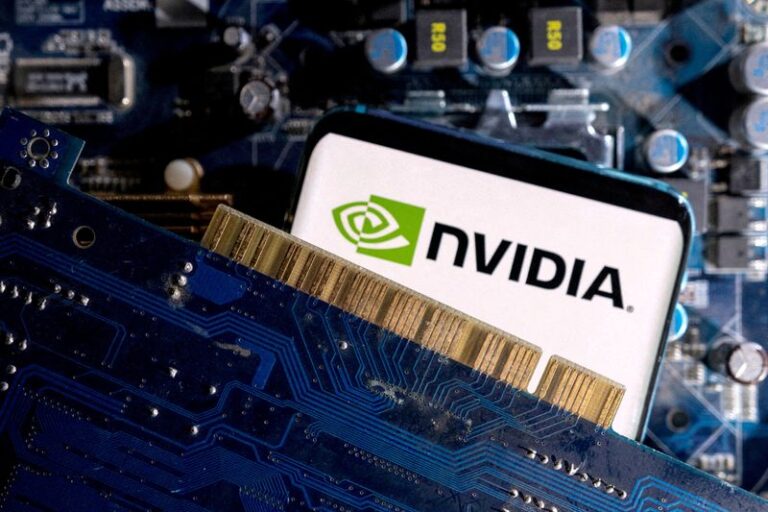The sharp sell-off in U.S. stocks is putting added focus on the valuations of tech stocks such as Nvidia (NVDA) and Microsoft (MSFT), which have driven the market higher for much of the year.
Despite the recent sell-off, the S&P 500 tech sector is trading at 29.5 times 12-month earnings forecasts, near the 20-year high it hit earlier this month. The broader market is also historically high, with the benchmark S&P 500 index trading at 20.7 times forecasts, above its long-term average of 15.7, according to data from LSEG Datastream.
“The market today is pretty expensive for us on a broad level,” said Philip Strehl, chief investment officer for the Americas at Morningstar Wealth.
“That will only lead to disappointment,” he said, noting that market expectations are high for a soft landing for the U.S. economy and individual company performance.
Market participants have been happy to pay for tech and growth stocks for much of 2024 as hopes about the business potential of artificial intelligence have fueled rallies in companies such as chipmaker Nvidia, sending their shares up nearly 130% this year.
Recent market trends suggest investors are becoming more wary of overvalued stocks. Earlier this week, earnings reports from Tesla and Alphabet rocked stocks, and on Wednesday the S&P 500 and Nasdaq Composite Index posted their biggest one-day declines since 2022. Despite their steepest declines since mid-July, both indexes have continued to rise strongly in 2024, up 14.5% and 15.6%, respectively.
Large-cap stocks Amazon (AMZN), Apple (AAPL), Microsoft, and Facebook-parent Meta Platforms (META) are scheduled to report earnings next week, increasing the risks for investors in big tech and tech-related stocks.
Rising valuations could also tempt investors to exit stocks if they face market turmoil from other factors, such as a changing outlook for the Federal Reserve to cut interest rates in the coming months or political risks from an already hotly contested presidential election.
U.S. companies generally face higher financial expectations, with S&P 500 profits expected to rise 12.1% in the second quarter compared to the same period last year, according to LSEG IBES. Of the 206 companies that have reported earnings so far, 78.6% have reported profits that beat analyst expectations, in line with the rate of beats over the past four quarters.
“Given how much valuation rerating has happened, the market will be expecting a pretty stellar result,” said Matthew Miskin, co-chief investment strategist at John Hancock Investment Management.
Many investors will be focusing on the tech sector and the so-called “Magnificent Seven” large-cap stocks that dominate the S&P 500 and Nasdaq (NQ=F). One example of the market’s recent mood shift is reflected in the reaction to Alphabet’s (GOOG) earnings. The company’s shares have fallen 8% over the past three trading days as concerns mount that investments in AI infrastructure will eat into profit margins, despite revenue that beat expectations.
“The bar is pretty high for tech stocks,” said Chuck Carlson, CEO of Horizon Investment Services. “People still need to be really surprised, and if they’re not surprised, they’re vulnerable to selling.”
All eyes will be on the two largest U.S. companies by market cap, Apple (AAPL) and Microsoft (MSFT), both valued at more than $3 trillion.
Apple trades at 30 times earnings, well above its five-year average of 25.5 and its 10-year average of 19.6, according to LSEG Datastream, while Microsoft trades at 31 times earnings, above its five-year average of 29 and nearly 25, respectively.
Some say high valuations support a rotation trade in which investors are selling large tech stocks and moving money into small-cap, value and other areas that have generated lackluster returns for much of the year.
Since July 10th, the small-cap Russell 2000 (^RUT) has risen 10%, while the S&P 500 (^GSPC) has fallen 3%.
“We expect investors to continue to extract cash from expensive tech stocks as (profit) growth recovers elsewhere,” analysts at Oxford Economics said in a Friday note.
Admittedly, not all tech and large-cap stocks may look expensive after the recent market sell-off. Meta Platforms, for example, is currently trading at 20.6 times earnings, compared with an average of 25 times over the past decade.
Looking at the broader picture, valuations remain far lower than they were during the dot-com boom of the early 2000s, when the tech sector traded at 48 times earnings.
At the same time, better-than-expected earnings could validate lofty valuations in tech stocks and give investors some much-needed confidence.
Analysts at UBS Global Wealth Management said Thursday that the S&P 500’s profit growth will be its strongest in two years. They expect the index to reach 5,900 points by the end of the year, about 8% above its current level. “Investors should prepare for periodic market declines,” the UBS analysts said. “However, we continue to expect the S&P 500 to recover.”
(Reporting by Louis Krauskopf; Editing by Illa Iosebashvili and Anna Driver)

